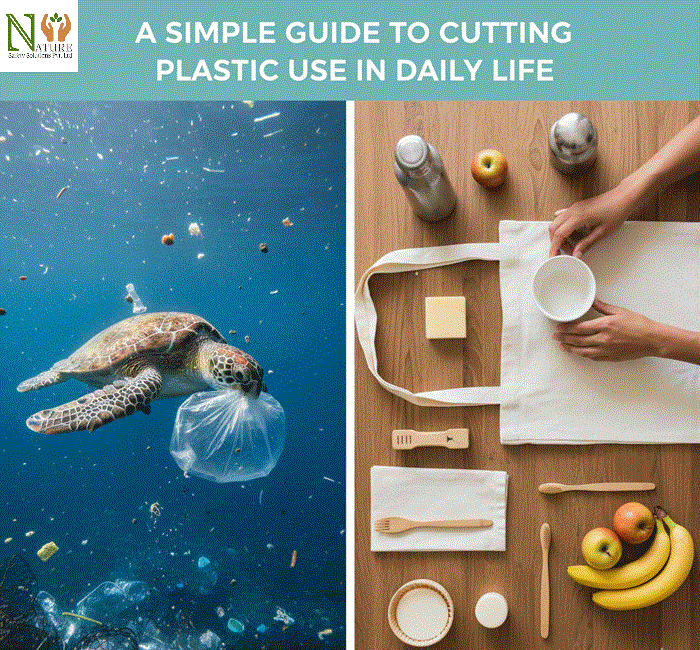Think about a sea turtle swimming in the ocean. Instead of jellyfish, it’s biting into a plastic bag that is floating on the water’s surface. As unfortunate as it is, this is not just a story. This is reality. Plastic waste has become one of the largest threats to the planet. It is found in homes, in rivers, in oceans, and even in the air we breathe.
On the bright side, you have the power to do something about it! There are simple, small changes you can make in your everyday life that can minimize plastic waste in our environment and therefore help save our planet. Here are some ideas we would like to share.

Where this all matters
Plastic does not biodegrade like banana peels and paper do. A bottle or container will remain in the ground for hundreds of years. During that time, the plastics will break down into smaller pieces, referred to as microplastics, and end end up in animals, and consequently, us.
By reducing plastic, you:
- Help keep the waters clean, including oceans and rivers.
- Help save wildlife.
- Help to reduce pollution in the air and soil.
- Help you to create a safer and greener world for future generations.
The problems are large, but it all starts with small changes.
Step 1: Say No to Single-Use Plastics
Have you considered how many things you use one time? Bags, cups, straws, spoons… All of these things last for minutes but stick around in the environmental forever.
- Here’s how to replace single-use plastic items with reusable items:
- Bring a cloth bag with you while shopping.
- Refill your water bottle instead of buying a new one.
- Choose not to use a straw or use a reusable straw.
- At events, choose a paper or metal utensils instead of plastic.
- Every time you say “no” to single-use plastic, you are saying “yes” to having a healthy planet.
Step 2: Choose Reusable
Convenience means disposable in today’s world. However, there are many reusable options that are just as easy, if not better!
- Store your meals in a stainless steel or glass container.
- Put your snacks in a jar instead of wrapping them in plastic.
- Always bring along a reusable coffee cup when you go out and grab coffee.
- Instead of using a paper towel, use a cloth napkin.
- Just a small habit shift soon turns into a ton of waste reduction.
Step 3: Shop With Planet in Mind
Plastic is mostly brought into our home via packaging. The next time you shop, take a minute to really notice all of the packaging.
- Opt to buy fruit and vegetables that are not individually wrapped in plastic trays.
- Look for brands that use refillable packaging or packaging made from recyclable materials.
- Buy in bulk to avoid the extra packaging altogether.
- Go to your local shops that encourage you to adopt a greener package free lifestyle.
Each purchase is a vote and companies react to your choice to purchase greener packaging.
Step 4: Green Swaps at Home
Plastics invade our kitchens and bathrooms – so we can easily eliminate plastics from our lives.
- Switch to a bamboo toothbrush instead of plastic.
- Instead of a bottled shampoo, try one of the many options available for shampoo bars.
- Consider buying toys or home items that use long-lasting wood, fabric or steel.
- Choose refill packs as an option.
These simple swaps can also make the experience feel more natural and less plastic.
Step 5: Recycle What You Can’t Avoid
Sometimes, plastic can be difficult to escape completely. And that’s okay – as long as you’re recycling it.
- Keep any plastic that you choose not to avoid separate.
- Be sure to rinse out any plastic bottles or containers before recycling them.
- Find out if there’s a recycling center near you.
- Teach children how to recycle, so they form a lifelong habit of recycling.
- Recycling keeps the plastic out of the landfills and gives new life to it.
Step 6: Lead by Example
Your choices may become the inspiration of others. If your friends see you carry a cloth bag or drink out of a steel bottle, they may want to do the same.
- Share some hints and tips with your family and friends.
- Post about your eco-friendly habits online!
- Encourage your school, workplace, or neighborhood to cut back on plastic.
- Help lead campaigns that promote clean and green living.
Positive change spreads quickly when people lead by example.
Also read:-
